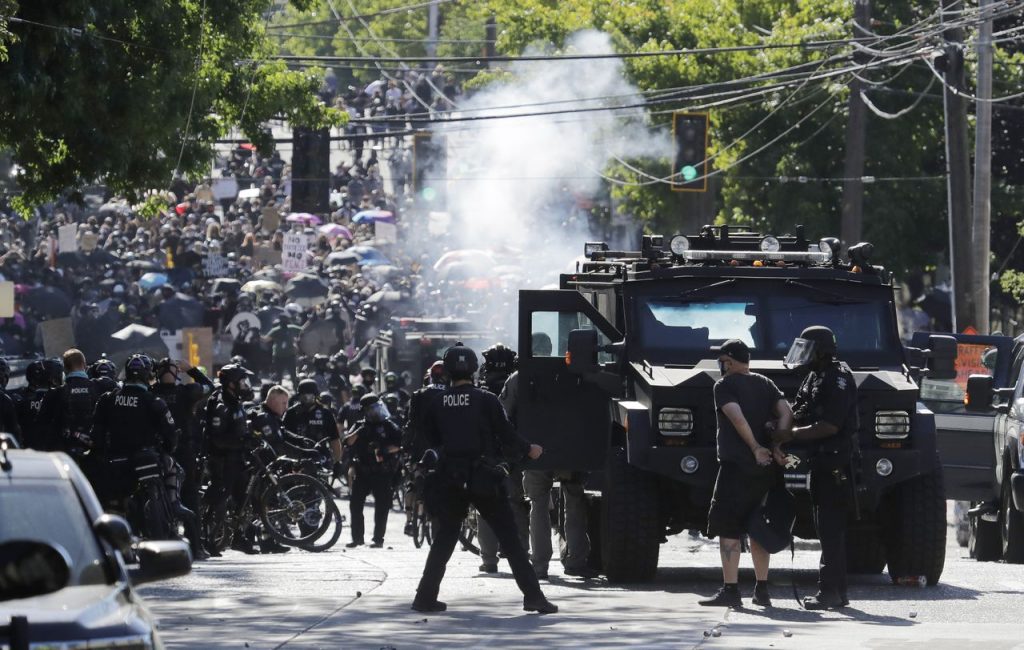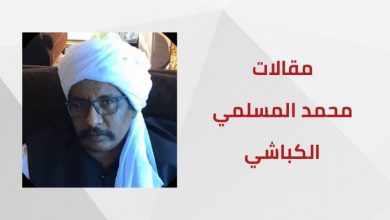?Sanctioning Sudan’s Central Reserve Police The Unjustifiable, Fragile US Decision


while suffering its failure towards the Ukrainian crisis, the superpower found only the Central Reserve Forces of Sudan, to impose mock sanctions in a desperate search for a false victory, and to feed the desire of international media to head for a new excitement.
By, Saif Addien Al-bashir
Meaningless, Unjustifiable:
Last Monday, the United States imposed sanctions on Sudan’s Central Reserve Police, a division of the wider police force, accusing it of using excessive force against peaceful protesters.
The U.S. Treasury Department said in a statement the said force, has been at the forefront of the “violent response” of Sudanese security forces to peaceful protests in Khartoum.
As a division of the Sudanese police affiliated to the Ministry of Interior, the Central Reserve Force performs its tasks based on the overall directions of the security forces entrusted with protecting peaceful demonstrations, without resorting to excessive force.
As a division of a department within the ministry of interior, it’s hard to believe that US is serious in imposing sanctions on CRF that has no direct or indirect ties or dealings with any foreign party. needless to say, that Sudan does not import police equipment and uniform from US or any other western country.
though the current sanctions are the incident triggered such a debate, this article will go beyond the recent US step, to discuss the root causes behind US successive sanctions against Sudan
Through the successive US administrations, whether Republicans or Democrats, US Sanctions became a norm of their foreign policy towards Sudan for decades. Given their little impact, Sudan no longer cared much about them even in their worst form, perhaps the patience of the people of Sudan was able to mitigate its effect in most cases.
Since Sudan independence, the United States has noted Sudan’s keenness on sovereignty. As an active member of the Non-Aligned Movement (NAM), Sudan has turned its back to both the commonwealth and the francophones, on the ground that the national sovereignty is never a compromised issue. for the great nation, and within its hegemony, sticking to sovereignty within Africa, should not go unpunished.
Arguably, for the people of Sudan, US sanctions, are more often than not, a matter of tedious routines.
Sanctions and the Stakeholders:
For former US secretary of State Henry Kissinger, and the most prominent figure in US foreign policy, sanctions are all about the competition between domestic politics stakeholders. And for the sake of this argument, I thought I should quote from his book:
Does America Need a Foreign Policy?
On congress role he said;
unfortunately, domestic politics is driving American foreign policy in the opposite direction. congress not only legislate the tactics of foreign policy but also seeks to impose a code of conduct on other nations by a plethora of sanctions. Scores of nations now find themselves under such sanctions.
On the role the White House he said;
Successive administrations have acquiesced, in part as a compromise to gain approval for other programs, in part because, absent an immediate outside danger, domestic politics has become more important to political survival than the handling of foreign policy.
On the role of the role of pressure groups;
What is presented by foreign critics as America’s overweening quest for domination is very frequently a response to domestic pressure groups, which are in a position to put the spot light on key issues by promising support or threatening retribution at election time and which support each other’s causes to establish their own claims for the future.
On the role of media;
Simultaneously, ubiquitous and clamorous media are transforming into a subdivision of public entertainment the intense competition for ratings produces an obsession with the crisis of the moment, generally presented as a morality play between good and evil having a specific outcome and rarely in terms of the long-range challenges of history. As soon as the flurry of excitement has subsided, the media move on to new sensation.
The double standards;
Since its establishment, the US security forces have adopted the worst practices towards every aspect of protest. The worst is the racism inherent in dealing with the protesters, or the attempt to criminalize blacks through anti-black elements. Evidence for that is abundant, perhaps the most recent and most hideous the killing of George Floyd, the 46-year-old black man On May 25, 2020, in the U.S. city of Minneapolis, and the following brutal crackdown on “Black Lives Matter” movement demonstrations. On August 4, 2020 Amnesty International USA Recorded 125 Separate Incidents of Police Violence Against Protesters, Medics, Journalists and Legal Observers in 40 States and D.C. During May and June Protests.
“The unnecessary and sometimes excessive use of force by police against protesters exhibits the very systemic racism and impunity they had taken to the streets to protest. The research shows that people who were simply exercising their human right to peacefully protest were met with such violence that they lost eyesight, survived brutal beatings, and suffered seizures and severe wounds,” said Ernest Coverson, Amnesty International USA’s End Gun Violence Campaign Manager.
Said the organization’s report on August,4 2020.
Through all of the above, it is clear that the United States should be the last to talk about the excesses of the security forces, as its record does not allow it to evaluate the performance of others, let alone criminalizing them.
It is true that its successive sanctions on Sudan aimed at damaging the country’s image and confuse its global and regional relations. At the end it discovers Through all of the above, it is clear that the United States should be the last to talk about the excesses of the security forces, as its record does not allow it to evaluate the performance of others, let alone criminalizing them.
It is true that successive US sanctions on Sudan aimed at damaging the country’s image, as well as confusing its global and regional relations, in an effort to hinder the country’s aspiration to utilize its huge recourses. Finally, the sanctions weapon rebounds on it to suffer from global isolation. Currently, even its Western allies are silently complaining about the use of sanctions. Their reaction towards the current sanctions against Russia indicated the prematurity of American decisions.



